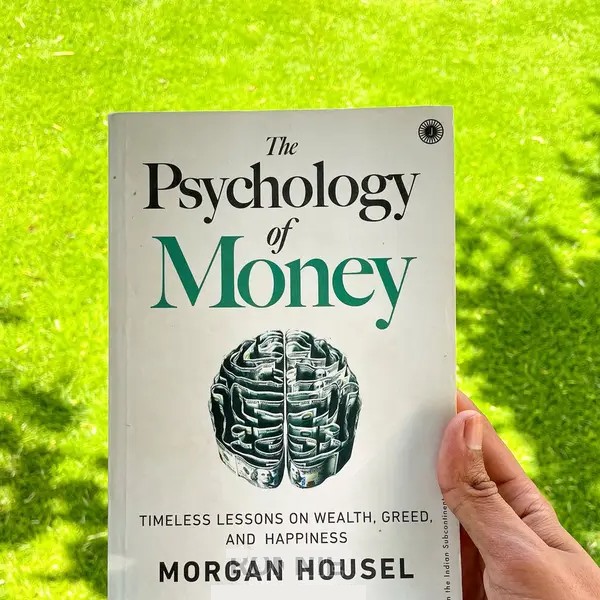Have you ever understood money? How do people understand money, to begin with? Is money understandable? Is money like math, where we can make one plus one as two? Or is money the X that we keep finding its value?
In the quest to understand money, I got hold of the financial book The Psychology of Money by Morgan Housel.
The book discusses the complexity and skepticism many people think about money and its whole concept.
It also talks about the psychological factors that influence people’s financial decisions and the behaviors of many people with money, without money, and around money.
In the introduction, he says, “Doing well with money has little to do with how smart you are and much more to do with how you behave. Additionally, behavior is hard to teach, even to brilliant people.”
How thoughtful is that?
Here are ten insights I grabbed from his argument on the psychology of money:
Contents
Luck & Risk
Are you luckily risky, or are you riskily lucky? How often have you decided to take the risk that led to the best luck you’ve ever imagined? Luck and dangers are some of the significant things that people don’t understand about money.
We may be lucky, but we are not all risk-takers. Many factors, such as where and when one is born, the association that one gets from an early age, and one’s upbringing, play a significant role in shaping financial outcomes.
For instance, many see wealthy people and generally categorize them as lucky. The question is, were they always fortunate? Also, what type of luck do they have when we all think we are blessed?
Bill Gates had both luck and risk appetite; he was lucky enough to have attended one of the few high schools with computers in 1968.
However, he was also courageous enough to look into the risks he could take to benefit from being one of the first to get curious about computers and their potential.
True to it, Microsoft is now one of the best things ever happening to technology. Was he the only one in that school, or were there many lucky kids, but not all had the risk-taking mentality?
Thomas Jefferson once said, “I’m a great believer of luck, and I find the harder I work, the more I have of it.”
We all need to work a little harder and take the risks that will bring our luck to fruition.
Getting wealthy vs. staying wealthy
How many stories of wealthy people do we hear from everyday news about them going flatly broke?
People who used to drive endless automobiles, changing them like clothes, ended up being flatly broke and even reaching out for help.
We have seen it on our social media platforms. We have seen the celebrities we grew up watching resurfacing twenty years later that they cannot afford basic needs.
Getting wealthy might be easy, but staying wealthy is where the work comes in. While working on trying to get rich, we should also work to know how to handle that wealth and stay wealthy.
Saving money
The culture of saving money should be introduced to children as young as they can make out one plus one to be two.
Getting to educate a kid on the importance of saving money can make the kid adapt to this culture from an early age.
Some significant benefits of saving money include financial security, a retirement plan, and a budget for future goals and aspirations.
Morgan gives the example of one janitor who worked as a janitor his whole life. Still, when he died, he had in his will one million dollars that his grandchildren were supposed to be given and some more for select charitable organizations.
Many people were astonished by how this could have been possible. To them, he was just a janitor, but the janitor knew that if he could do it calculatedly, it would be possible.
Do you think you can die wealthily in your current wealth, or do you have to look for better solutions? Are you saving your money, or is your money saving you?
Room for Error
Even in the quest to make all the calculative risks that might lead us to get to everything we ever dreamt of, we should often leave room for error.
Sometimes, we cannot stay wealthy because we need to give the rich room for error.
Psychologically speaking, in the journey of doing something, any minor setback often separates the winners and the losers.
Financially, money and wealth also have setbacks that might affect our mental state.
When we leave room for error, that way, we allow ourselves to grow our financial health, coexisting with the psychological understanding that things do not always go as planned.
Never enough
How much money is enough? Why do we see many people who are billionaires and say to ourselves that maybe when we reach their stage, we might retire and never look for more of this money?
Why do we keep working when we get to that level?
Sometimes, we dream of getting this salary, but when we get to the point, we still feel like we need more.
When I was in college, I used to believe that getting a job, regardless of the job, would be the solution to all my problems.
I got out of college, and true to it, I got a good job that was very well-paying.
However, before the next pay period, I would check my account at the end of the month and realize that the pay needs to be higher.
My expenses were increasing, and my needs and wants were also growing.
I got another salary increase and thought that would be the most prominent solution to my wants. This time, I would have some cash by the end of the month.
It never happened; the salary was insufficient, and I could not understand why. Basic needs versus desires and contentment values should be considered when discussing enough money.
Finding the balance between meeting basic needs, pursuing goals, and finding contentment with one’s current financial situation and having regular self-reflection and financial planning can help individuals align their financial resources with their values and priorities.


Freedom
Money comes with freedom. The human mind is structured in that we believe that money is the way to freedom. Many people want the freedom that comes with having money, I included.
Isn’t it free to go to the supermarket and shop without cross-checking prices or using the calculator for your sanity?
Isn’t freedom to wake up and decide today that I will travel to a particular place and not worry about how much money I need?
Who wouldn’t want that?
However, many need help understanding how to work around this freedom. Freedom is nice.
Freedom is good. Sometimes, someone can get this freedom and make very wrong choices about their financial status, losing independence and money.
The Power of Compounding
The power of compounding is a huge factor in understanding how money works. Compounding works side by side with time.
The earlier you start investing or saving, the more time your money has to compound since compounding can lead to significant growth over time.
The longer the money is allowed to compound, the more significant the impact on overall wealth in terms of growth strategies. Compounding is an advantage, especially for long-term investment strategies like retirement planning.
By starting early and consistently contributing to investments, one can take full advantage of the compounding effect, allowing one’s wealth to grow.
Tales you win
‘The Psychology of Money’ explains this with the famous Walt Disney founder. He just had this tale of making it more realistic for the kids, and now people are enjoying Disney Land, and everyone dreams of going to Disney Land.
This was a tale that many people had not seen to be of great benefit, especially before implementation. He just wanted to explore this, and true to his stories, he won.
When we look at the current generation, we can talk about the unpredictable events that have led to people winning significantly.
For instance, TikTok brought many people to the limelight by just doing their tales.
Take Khaby Lame as an example; he was trying to understand how people were doing things the most complicated way.
In his quest to say there is always an easier way, he ended up being the most followed person on TikTok and getting more and more opportunities.
When we think of these tales that seem only realistic, we can win some of them.
Not all tales are winners, but if we believe in ourselves more than the world does, we may win some tales.
Wealth is what you don’t see.
In a world where technology and the internet have become our new enslavers, we see almost everything people do, even when we are not looking.
Many of us need to see the behind-the-scenes intricacies of how these people got to be where they are or who they are, for that matter.
When we see fancy cars and fancy restaurant pictures, we admire and envy them without really knowing how they got there.
Sometimes, when you are questioning or doubting yourself about not being wealthy because of that classmate you saw driving a Benz, you should direct that energy to the opportunities available, chart a course, and keep grinding.
You will change
As we grow, we see these changes around our goals and our knowledge or understanding of things. Sometimes, these changes might be positive, and sometimes, they are harmful.
In understanding money, these changes can be attributed to social influence, increased confidence, power and status, pressure, expectations, and lack of financial discipline.
Financial goals that you had ten years ago are not the same goals that you have now and will not be the same ones that you will have ten years from now.
Everything about growth and money can change. You might also change with how much money you keep getting. However, change is also two ways. Will you change to be a better person with the increased income, or will you change to be worse?
In conclusion, The Psychology of Money may make us try to understand money and make it make sense.
Money is difficult to understand, and I think many of us need help understanding it, but we try to make sense of the patterns.
The trends and the paradigm of money can make one create and stay wealthy – if they try and understand it so well. Money is not easy to understand, but it might be easier to grow after understanding.
Money is mental, too. We all need to study the psychology of money so that we don’t repeat the mistakes holding us behind.






